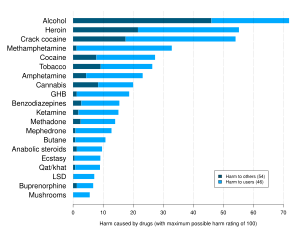Passive drinking

Passive drinking, like passive smoking, refers to the damage done to others as a result of drinking alcoholic beverages. These include the unborn fetus and children of parents who drink excessively, drunk drivers, accidents, domestic violence and alcohol-related sexual assaults[2]
On 2 February 2010 Eurocare, the European Alcohol Policy Alliance, organised a seminar on "The Social Cost of Alcohol : Passive drinking".[3] On 21 May 2010 the World Health Organization reached a consensus at the World Health Assembly on a resolution to confront the harmful use of alcohol.[4]
See also[edit]
References[edit]
- ^ Nutt DJ, King LA, Phillips LD (November 2010). "Drug harms in the UK: a multicriteria decision analysis". Lancet. 376 (9752): 1558–1565. CiteSeerX 10.1.1.690.1283. doi:10.1016/S0140-6736(10)61462-6. PMID 21036393. S2CID 5667719.
- ^ Smith, Rebecca (16 March 2010). "'Passive drinking' is blighting the nation, Sir Liam Donaldson warns". The Daily Telegraph. Archived from the original on 20 March 2009. Retrieved 30 May 2010.
- ^ "The Social Cost of Alcohol : Passive drinking – Eurocare event". European Alcohol Policy Alliance. 25 February 2010. Retrieved 30 May 2010.
- ^ "Call for action to reduce the harmful use of alcohol". World Health Organization. 21 May 2010. Archived from the original on 23 May 2010. Retrieved 30 May 2010.
